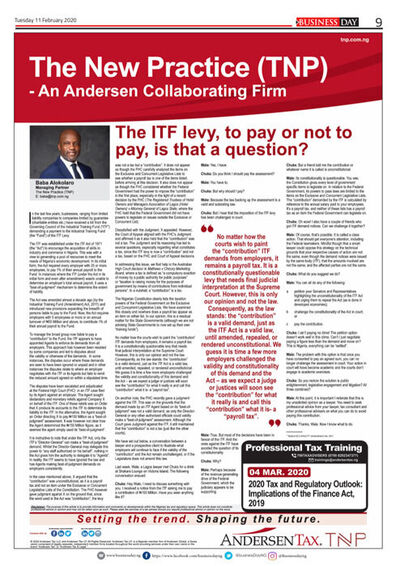In the last few years, businesses, ranging from limited liability companies to companies limited by guarantee (charitable entities etc.) have received a bill from the Governing Council of the Industrial Training Fund (“ITF”) demanding a payment to the Industrial Training Fund (the “Fund”) of the ITF Levy.
The ITF was established under the ITF Act of 1971 (the “Act”) to encourage the acquisition of skills in industry and commerce in Nigeria. This was with a view to generating a pool of resources to meet the needs of Nigeria’s economic development. In its initial form, the Act required every employer with 25 or more employees, to pay 1% of their annual payroll to the Fund. In instances where the ITF (under the Act in its initial form and even after amendment) was/is unable to determine an employer’s total annual payroll, it uses a “best-of-judgment” mechanism to determine the extent of liability.
The Act was amended almost a decade ago (by the Industrial Training Fund (Amendment) Act, 2011) and introduced new provisions expanding the breadth of persons liable to pay to the Fund. Now, the Act requires employers with 5 employees or more or an annual turnover of ₦50 Million and above, to contribute 1% of their annual payroll to the Fund.
To manage the broad group now liable to pay a “contribution” to the Fund, the ITF appears to have appointed Agents to enforce its demands from all employers. This approach has however been resisted by some companies and led to disputes about the validity or otherwise of the demands. In some instances, the disputes occur where these demands are seen to have been ignored or unpaid and in other instances the disputes relate to where an employer negotiates with the ITF or its Agents but fails to remit the reduced amount agreed on within a stipulated time.
The disputes have been escalated and adjudicated at the Federal High Court (FHC) in an ITF case filed by its Agent against an employer. The Agent sought declaratory and monetary reliefs against Company X on behalf of the ITF. One of these reliefs was an Order that X produce its accounts to the ITF to determine its liability to the ITF. In the alternative, the Agent sought an Order directing X to pay ₦150 Million as a “best-of-judgment” assessment. It was however not clear how the Agent determined the ₦150 Million figure, as it seemed the agent simply used its “best-of-judgment”.
It is instructive to note that under the ITF Act, only the ITF’s “Director-General” can make a “best-of-judgment” demand. Whilst the Director-General may delegate this power to “any staff authorized on his behalf”, nothing in the Act gives him the authority to delegate it to “Agents”. In reality, the ITF seems to have ignored the law and has Agents making best-of-judgment demands on employers consistently.
In the case mentioned above, X argued that the “contribution” was unconstitutional, as it is a payroll tax and not an item under the Exclusive or Concurrent Legislative Lists of the Constitution. The FHC however gave judgment against X on the ground that, since the word used in the Act was “contribution”, the levy was not a tax but a “contribution”. It does not appear as though the FHC carefully analyzed the items on the Exclusive and Concurrent Legislative Lists to see whether a payroll tax is one of the items listed, before arriving at this decision. It also does not appear as though the FHC considered whether the Federal Government had the power to impose the “contribution” in the first place, especially in the light of a recent decision by the FHC (The Registered Trustees of Hotel Owners and Managers Association of Lagos (Hotel Owners) v Attorney General of Lagos State, where the FHC held that the Federal Government did not have powers to legislate on issues outside the Exclusive or Concurrent List).


